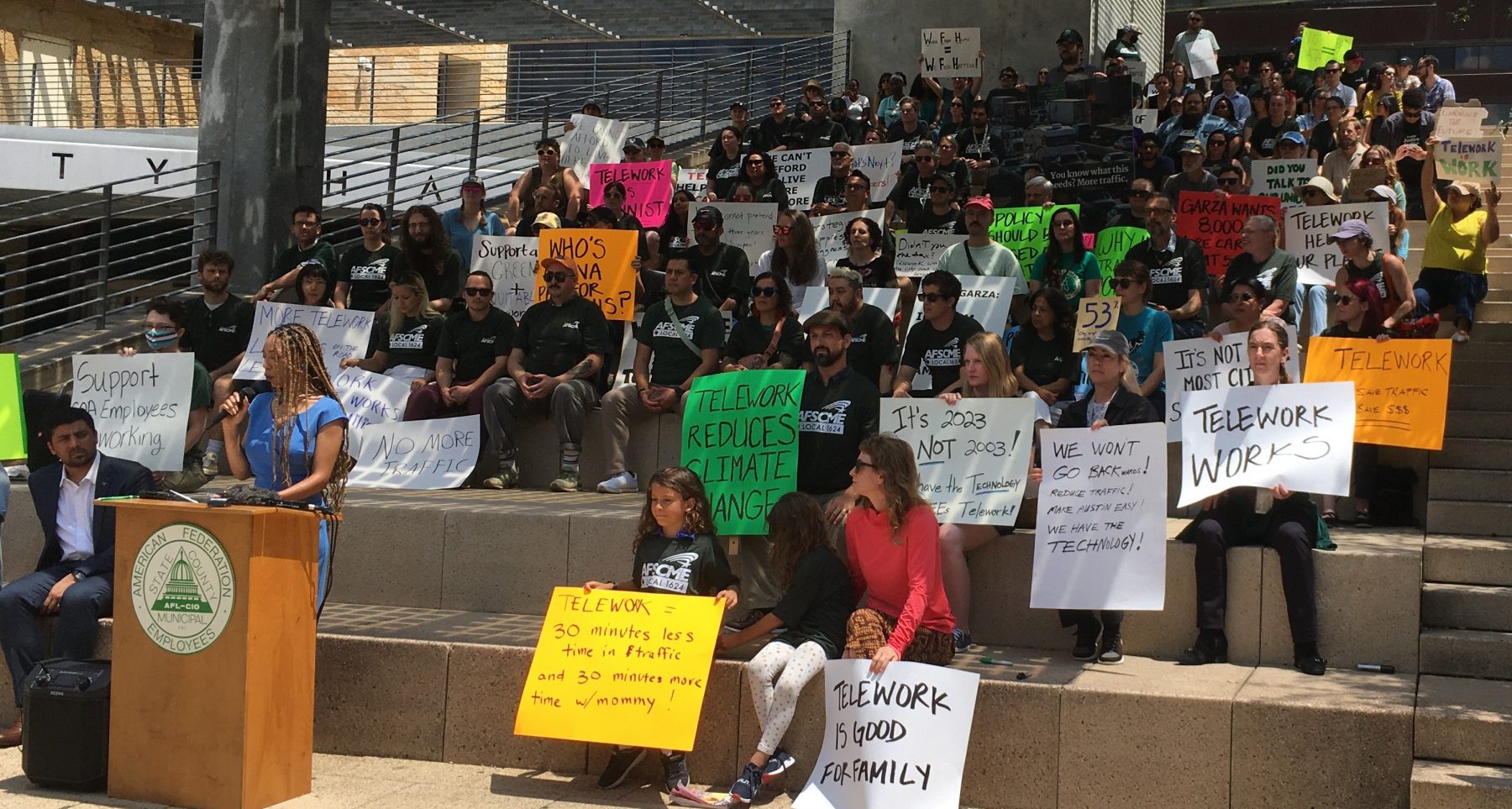by Gumbo
Late in the day on Thursday, 11 May 2023, City of Austin employees were treated to a surprise memo from Interim City Manager Jesus Garza. Effective in October of this year, the city’s flexible telework policy will be constricted considerably. Teleworking employees, many of whom have had to move out of Austin, or Travis County entirely, will be required to report to the office at least three days out of the week and executives five days. The official policy has yet to be written; what was announced was simply the intent to change the policy.
City of Austin employees whose jobs are eligible for teleworking have enjoyed the ability to work fully or mostly remote since at least the COVID-19 pandemic began in 2020. The flexibility of teleworking made the city a competitive employer in a landscape where most private sector jobs pay more in salaries. In some fields, like IT, it has largely become industry standard. In either case it has been a working condition that makes city employees’ lives far easier, and Interim CM Garza’s move to restrict it can only be interpreted as a tightening of control by the Watson administration.
The decision was telegraphed for months. Surveys were circulated internally in some departments, such as Watershed Protection, and by some of the city’s affinity groups (employee resource groups that are sponsored by the main city HR Department’s Diversity Division) but not officially by the City Manager’s Office. Departments were restructured, merged, or split with little warning or input from workers. Talk of budget cuts has abounded and pressure has been high ever since the highly-publicized mishandling of Winter Storm Mara in early February. Throughout, Interim CM Garza’s messaging has been about employees having a “bias to action” and needing to “emphasize the values of teamwork and innovation within the organization.”
However, making drastic changes to the structure and conditions of someone’s workplace only shows a bias against workers. Teamwork has never been easier than with the flexible and innovative teleworking setup offered by the city. Many city employees live far outside the city and would spend long hours commuting to and from the office, time wasted in a car that could be spent at home after teleworking. Teleworking is explicitly listed as a transit goal in the Austin Strategic Mobility Plan that has guided the city’s approach to transportation infrastructure since 2019, and now it is due to be revoked just in time for a massive I-35 expansion. Survey results showed that city employees would consider other employment if forced back to the office more than two days per week—a death knell for understaffed city services with high vacancy rates.
The impacts of this change cannot be overstated. City employees with children have benefitted from flexible telework policies, allowing them to save money on childcare and time on school pick-ups. They have been able to circumvent the rampant unaffordability in Austin proper by living in Kyle, Buda, Leander, and elsewhere and still performing crucial services for the city government. If faced with the decision between commuting for upwards of an hour both ways or finding a new job, many will leave and the city will be unable to offer exemplary services to its citizens that Interim CM Garza claims to be improving with this change.
The question on everyone’s minds is why? Why take away an equitable working condition rather than ensure there continues to be adequate air conditioning in waste collections trucks before the summer? Why force people back into physical offices, putting even more cars on the road, when space doesn’t exist for them and furniture budgets have been gutted? Why make the city a less attractive employer when the real reason city services are suffering is high vacancy rates, not agreeable working conditions?
With only a handful of memos as evidence, Garza’s full motivations are unclear and speculation is able to run rampant. He has specified that he wants to “work to ensure the public’s trust and be responsive to their needs” and that his goal is “to organize our people and our work so that the organization operates efficiently.” Making sudden and sweeping changes to the way the city has operated, and operated effectively, during the pandemic years does not engender trust, however. There is nothing efficient about requiring employees to report in-person to an office where they will simply sit through virtual meetings in a dim cubicle instead of at their homes. There is nothing efficient about operating in opposition to the official transit goals of the city. There is only a feeling on management’s part that real work is really getting done if people are forced to report in person. Like any boss, it appears that Garza’s only real goal is tighter control of his workers.
These sudden changes are being pushed through by an interim city manager who is by definition temporary. They are typically announced late in the week so there is little time to digest them before the week ends and the cycle continues. The telework changes are expected to take effect at the height of budget discussions at council, an already tense and stressful time of year. If the goal is organizational efficiency and building trust, then they just do not make sense. Deepening the irony of the situation, the telework policy change was unveiled at the end of Public Service Recognition Week.
The public health aspect of the changes cannot be overlooked either. The COVID-19 emergency declaration may have expired on 11 May 2023, but the COVID-19 virus did not disappear overnight. The virus continues to mutate and thousands die from it every month. Millions more suffer from Long COVID symptoms that stick around for months or years after first contracting the disease. Forcing people back into close quarters with little rhyme or reason will lead to higher community spread rates and there are no protections left for city employees who do get sick and are forced to use limited sick leave.
City employees do not have to take any of this lying down, however. There is a temptation to quit. To say “to hell with this job, to hell with this city,” and hang up the hat. But quitting won’t solve this problem, because quitting doesn’t change the nature of working without a say in your working conditions. Field employees with busted equipment and office employees being forced into long commutes share the same struggle against a city manager set on disrespecting us and treating us like we are expendable.
Our union, AFSCME 1624, has already pledged to fight this. We can take that fight further by organizing with our coworkers to issue our demands for adequate pay and safe, healthy, empowering working conditions. We can struggle for more than a paltry 4% raise and an attack on our working conditions. After all, WE are the union, WE keep the city running, and WE deserve more.
In case you missed it, see AFSCME 1624’s statement on telework changes at the City of Austin. Join us in the union fighting for better working conditions for all!
If you are city or county employees and have specific organizing ideas and would like to talk about them with friendly public workers, fill out this quick survey and reach out at atxrank.n.file@gmail.com.

